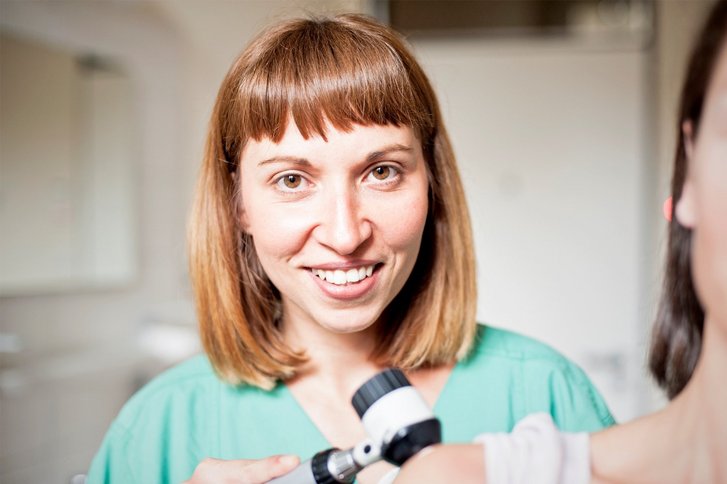We offer the following therapy procedures:
COVID-19 –> information and vaccination centre
All therapies for skin cancer at a glance

Malignant skin tumours such as basal cell carcinomas, squamous cell carcinomas, melanomas and cutaneous lymphomas are among the most common types of cancer. While early stages are almost always curable, advanced tumours often require complex treatment.
Diagnostic
The most common type of skin cancer is white skin cancer. Basal cell carcinomas and actinic keratoses are nowadays detected by photodynamic diagnostics. The spread of the tumour is made visible by fluorescent light.
In the case of black skin cancer, also known as malignant melanoma, we take small samples from the suspicious tissue (biopsy) for an exact diagnosis and examine them in the laboratory. Depending on the type of cancer, its extent and localisation, the best individual therapy is determined.
If a melanoma is present, we also examine the efferent lymph node (sentinel lymph node) to assess the spread of the tumour and to plan therapeutic measures. For this purpose we perform a so-called sentinel lymph node biopsy.
Tumour Conference
Our Skin Cancer Centre is part of the Oncology Centre and certified by the German Cancer Society. Within the framework of our interdisciplinary tumour conference, we present each individual patient case and discuss the best therapy strategy with experts from all the disciplines involved.
Surgical removal of the tumour
The surgical removal of the tumor is usually the method of choice in the fight against skin cancer. With the help of 3-D histology, we check the edges of the incision in the tissue for remaining diseased cells during the surgical removal of the tumour. The primary goal of microscopically controlled surgery is the complete removal of malignant tumors while protecting the healthy surrounding tissue as much as possible.
For larger operations, we close the affected area as gently as possible (reconstructive defect closure). In doing so, we use techniques of stretching or shifting the surrounding skin (flap plasty).
Immunotherapies and targeted therapies
We also offer effective and proven forms of treatment in the field of drug therapy. By means of immunotherapy or targeted therapies, cancer cells are attacked in a targeted manner, while sparing normal tissues as much as possible.
Chemotherapy
Chemotherapy can be applied locally by applying a highly effective ointment directly to the diseased areas. In most cases, however, chemotherapeutic treatment is systemic, i.e. it acts throughout the body. The medication can be administered either in tablet form or intravenously (as an injection).
Photodynamic therapy (PDT)
Photodynamic Therapy (PDT) is mainly used for fair skin cancer and precancerous lesions. Red cold light destroys the tumor cells in the areas that were previously treated with a light-sensitive cream. This form of therapy targets the tumour tissue directly and largely spares the neighbouring healthy skin.
Electrochemotherapy
Electrochemotherapy (ECT) is a method in the treatment of patients with advanced skin cancer or skin metastases of other tumors. Here, the effect of chemotherapy is enhanced by additional electrical pulses.
Cryotherapy (cold therapy)
In cryotherapy, liquid nitrogen with temperatures between 70°C and 196°C destroys the tumor tissue by cold. This method can be an alternative to surgery in certain cases. It is used especially for older patients or for superficial white skin cancer.
Extracorporal photopheresis
Extracorporeal photopheresis ("ECP") is a relatively new therapy in which the cells of the blood are irradiated by light of a specific wavelength (UVA light). The procedure is similar to blood washing (dialysis), in which blood is taken and then reintroduced after treatment.
Radiotherapy
Radiotherapy is a local measure in which the cancer tissue is destroyed accurate to the millimeter. This form of therapy is usually used in combination with surgery and/or drug therapy or chemotherapy. We also use radiotherapy successfully to alleviate pain caused by tumours and the risk of bone fractures due to tumour metastases.
Clinical trial
Our skin cancer centre offers patients with high-risk and advanced melanomas and cutaneous lymphomas the opportunity to participate in national and European studies.Our skin cancer centre offers patients with high-risk and advanced melanomas and cutaneous lymphomas the opportunity to participate in national and European studies.
You can find more information here
In cooperation with the Oncology Centre we also offer:
- Psycho-oncological care: Specially trained psychologists are available to help you deal with the diagnosis, accompany you to doctor's consultations if necessary and help you to regain mental balance.
- Social services: The social services help with the initiation of rehabilitation measures, with the search for home care and with the procurement of aids.
- Tumor passport: The tumour passport contains all relevant data and findings, your follow-up appointments and important contacts.
Do you have any questions?
We will be happy to help you personally with your request. Make an appointment here or talk to your dermatologist about a treatment with us.
International Services
Telefon
Öffnungszeiten